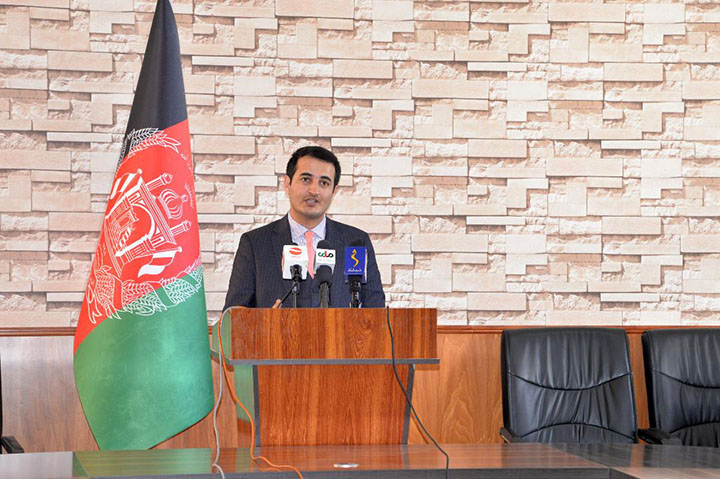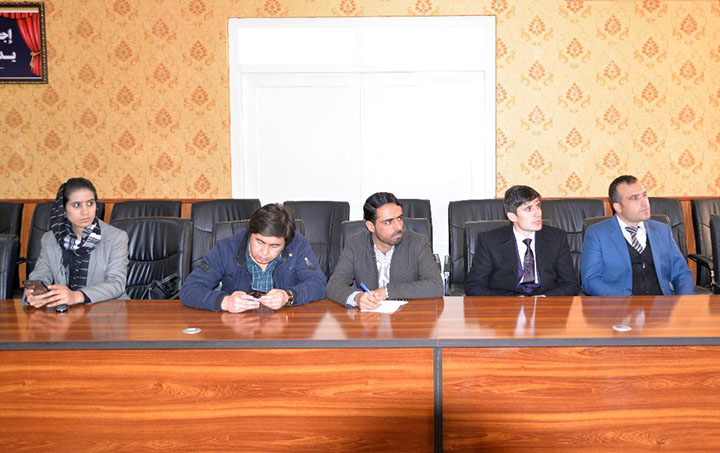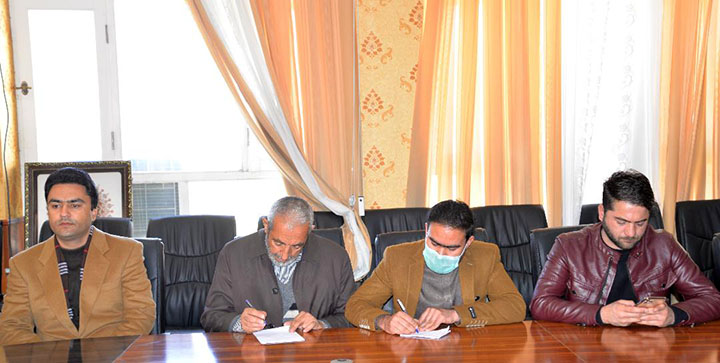Ministry of Justice Drafts and Revises Election Law, Law on Political Parties and Six other Legislative Documents

The Ministry of Justice briefed in a press conference the progresses made in drafting and revising of eight important legislative documents. These legislative documents include the draft amendment to election law, draft law on lobbying, draft law on preservation of cultural heritage, draft law on financing political parties and election campaigns, draft law on prevention of conflict of interest, draft regulation on collecting and expending of proceeds of drug trafficking, draft amendment to law on political parties and draft amendment to law on associations.
Mohammad Aman Riazat, spokesperson to the Ministry of Justice, said at this press conference held on Wednesday, 2nd Dec in the headquarters of this Ministry, that the election law taking the problems that existed in previous elections into account, has been revised based on the views of relevant entities and experts.
He added that the revision of this law has been underway since May this year by Legislation Drafting Project but is now completed and will soon be further processed. He believes that in order to further enrich this law, the views of relevant institutions, elites and experts will be sought during scrutinization of the law.

The modality of using technology in the elections and settling the election related disputes, election system, elections structure, supervisory systems of this process, voters registration process and enforcement mechanisms of the mentioned law are the main issues that has been discussed and revised.
Law on political parties is also another important legislative document that has been revised. This law as per the assessments made on vulnerabilities, has been prepared and codified in eight chapters and 63 articles.
The spokesperson to Ministry of Justice said that in the new draft law on political parties, explicit approaches have been taken into consideration for the establishment of political parties, monitoring the activities of parties, financial affairs, and their dissolution and likewise, the enforcement mechanisms are further strengthened. According to him, this law seeks to guarantee the participation of parties in elections.
Law on financing political parties and elections campaigns are newly drafted and manages issues related to the financing of political parties and election campaigns, ensuring transparency and accountability, modality of financial aids to political parties and the ways that political parties may take part in elections campaigns.
Mohammad Aman Riazat said that the Ministry of Justice for the first time has drafted the law on lobbying for the purpose to regulate lobbying related issues, supporting opinions and suggestions of experts in policy making and legislation, prevent illegal influence in legislative entities and government departments, and further supports the rights and freedoms of vulnerable groups of society such as women and children in the country and provides for the enforcement of rule of law and fight against corruption and injustice.

He further added that in the preliminary draft of this law, sampling has been made of Macedonia, Canada and American laws in which, the lobbying has been legitimized and its scope is clearly defined.
The spokesperson to the Ministry of Justice further said that the draft law on associations has been revised to strengthen monitoring methods of social institutions activities, to provide exact definition of associations, to resolve conflict of laws regarding the associations and to provide mechanism for establishing and dissolving of associations. In this draft, civil activities performed outside the social organizations has been taken into account observing the criteria set forth in the law.
He pointed out to the draft law on prevention of conflict of interest and said this law has been drafted based on the Constitution and has been drafted with the aim to prevent the conflict of interest of the president, his deputies, chief justice and members of supreme court, judges, heads of supreme court, minister advisers, president advisors, members of national assembly, provincial, districts and villages councils, governors and their deputies and members of independent commissions and sub governors.
The spokesperson to the Ministry of Justice said that the draft law on cultural heritage preservation has been prepared to preserve and strengthen historical heritage, cultures and different religions in the country including Hindu and Jew Sects.
He added that the formation of archeology council to implement this law and to make the municipalities and governors responsible in provinces to protect historical monuments and making effective the role of media in preserving cultural and historical values and promote its protection, were the important issues that has been considered in this draft. During drafting this document the cultural commissions of two houses, Ministry of cultural and information and faculty of archeology of Kabul University have been consulted.
The spokesperson for the Ministry of Justice said that this Ministry has also drafted the regulation on collection of proceeds of drugs trafficking in order to prepare grounds for verification of illegal properties emanating from drugs trafficking, and to effectively and transparently manage the sequestrated and confiscated properties of these crime, coordination among government entities, foreign countries and international institutions for the identification of these properties and to regulate the duties of justice institutions in this regard.
He stipulated that the Ministry of Justice shares the draft laws in every stage with the people and this is the unchanging functional policy of this Ministry to include the views of people and experts in the laws.
The spokesperson to the Ministry of Justice said that drafting and scrutinizing of laws in consultation with the people particularly the experts, guarantees the open governance and helps realizing the rule of law. He added that the Ministry of Justice doesn’t want to draft and scrutinize laws covertly and behind the closed doors, but tries to draft and process laws in consultation with the scholars, experts and public bodies.
